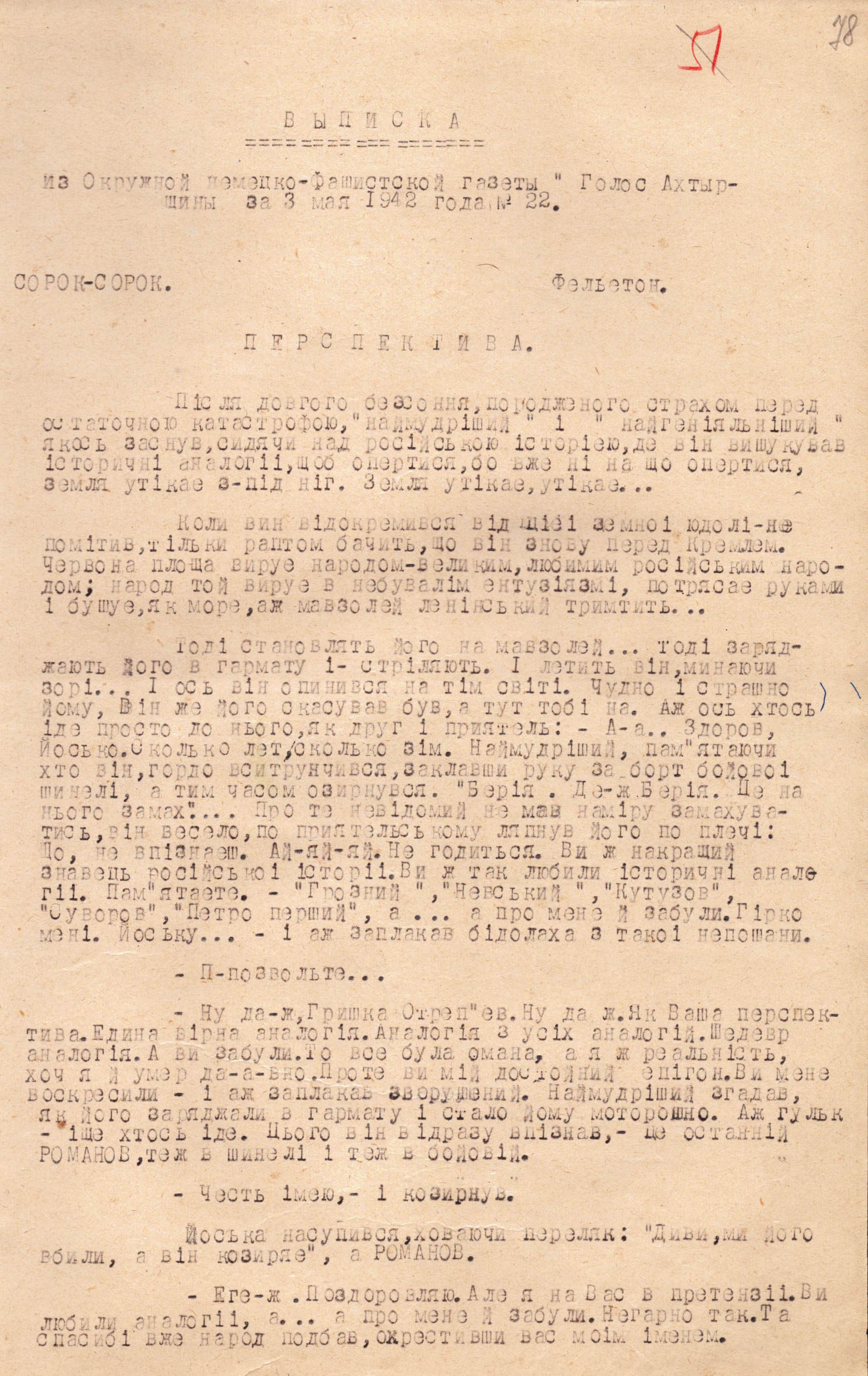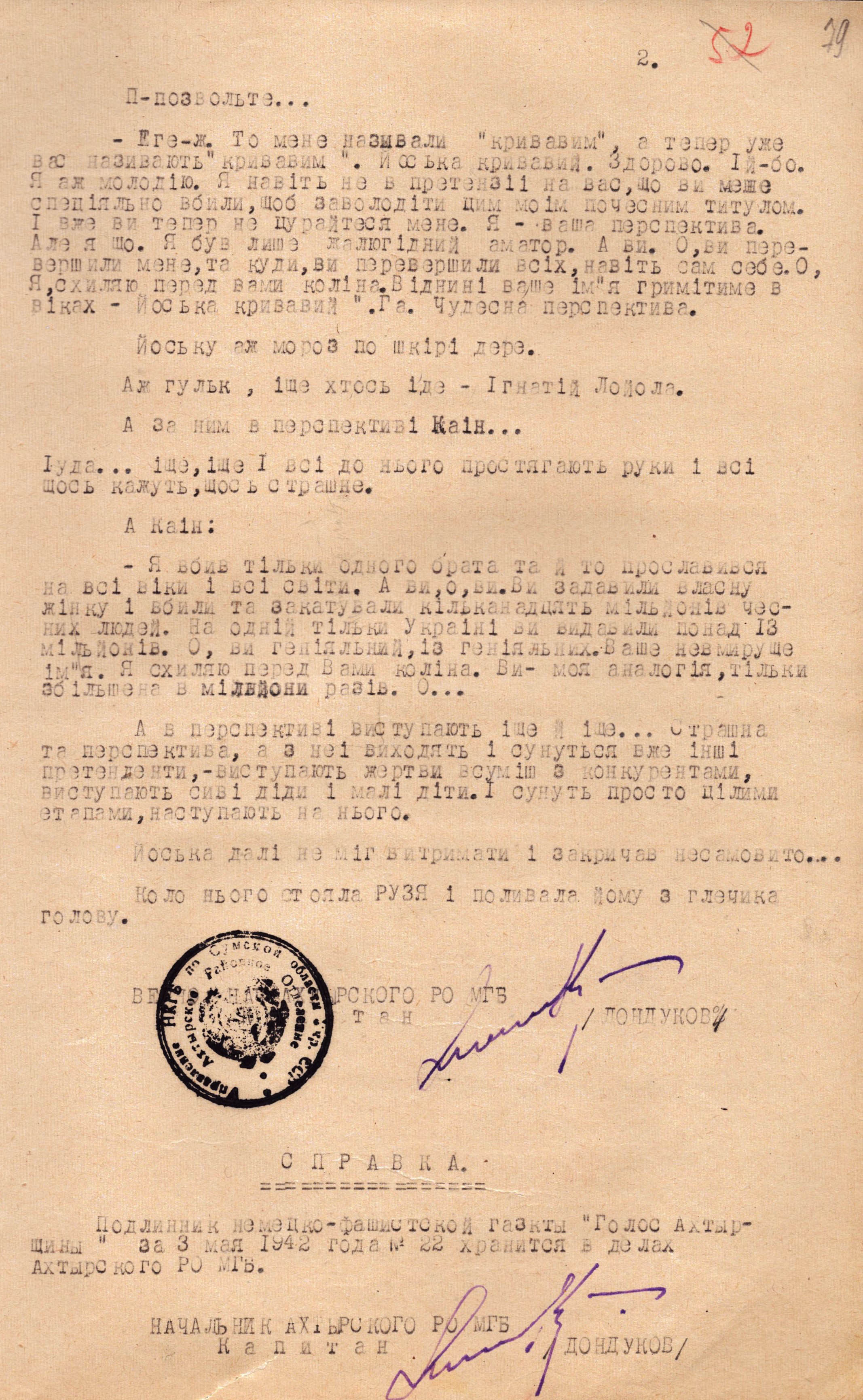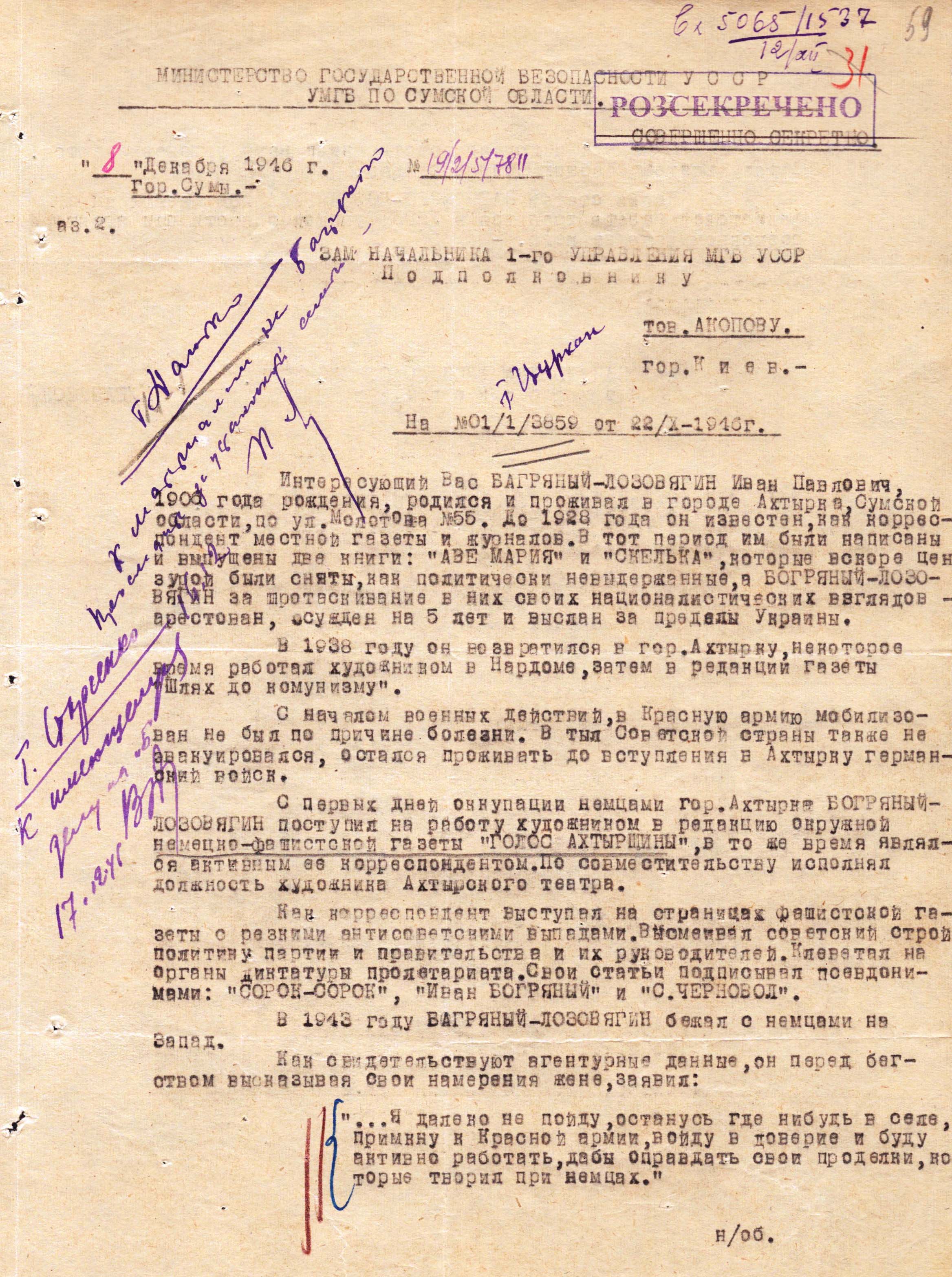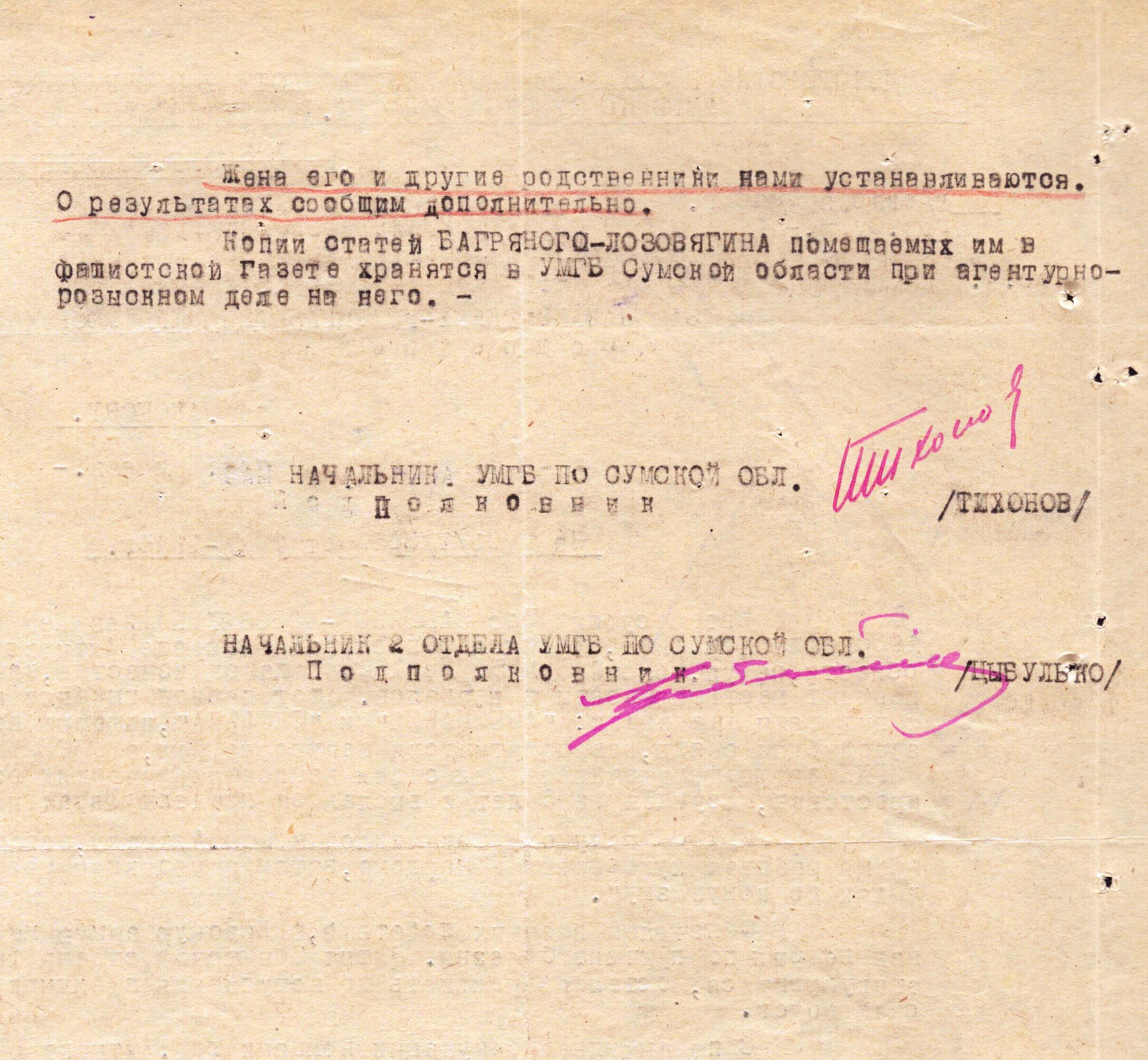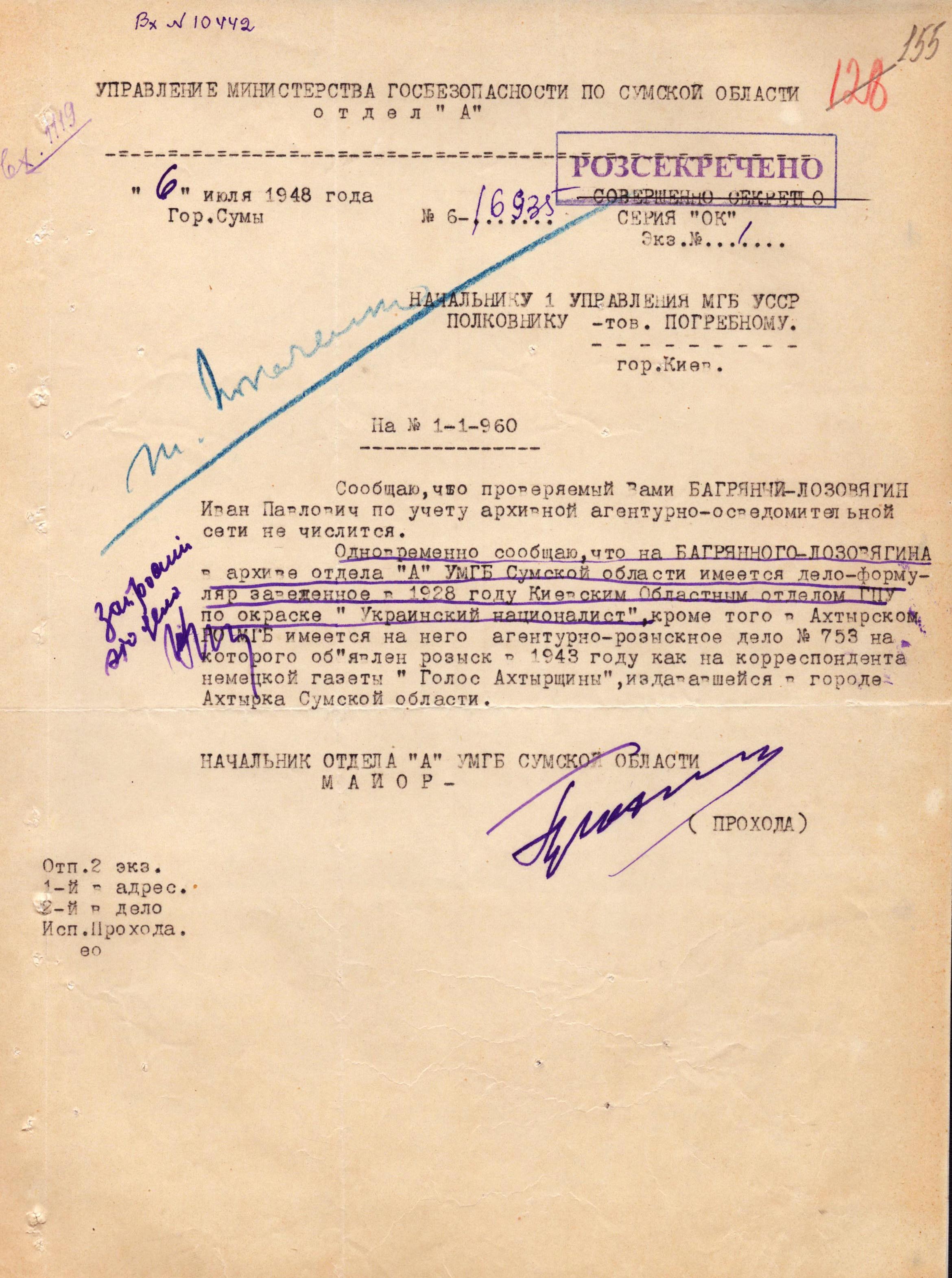Unknown Pamphlets by Ivan Bahrianyi
9/19/2024
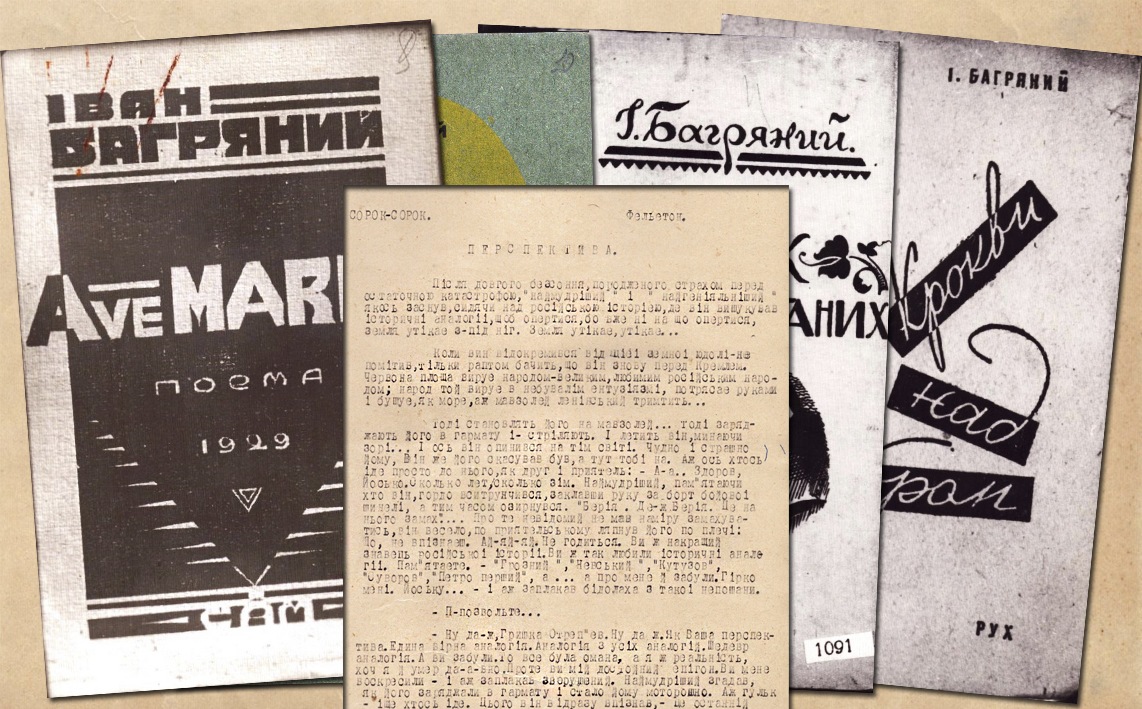
In the materials of the operational cultivation of the famous political activist and writer Ivan Bahrianyi, which are in the archives of the Foreign Intelligence Service of Ukraine along with the nkvd/mgb/kgb’s references, agent messages, plans and reports, there are his literary works, which the chekists attached to the case as evidence of his anti-soviet activities. Among other things, of particular interest are some of the author's journalistic articles and pamphlets from thetimes of the Second World War, which have not yet come to the attention of literary critics and researchers of his work.
The declassified documents shed light on how for several decades, the chekists had been conducting operational cultivation of Ivan Bahrianyi, repeatedly arresting and exiling him, searching for him abroad and trying to persuade him to cooperate and return to the ussr, intimidating, discrediting and compromising him in his inner circle. In this way, they sought to disrupt the activities of the party he led and his relations with other Ukrainian emigrants.
According to archival documents, a separate area of the operational work was the collection and thorough study of Bahrianyi's works. Some of them, such as the brochures “Chomu Ya Ne Khochu Vertaty na “rodinu” (“Why I Do Not Want to Return to the “motherland”), “Hanba Rabovlasnykam”(“Shame on Slave Owners”), the poetry collection “Do Mezh Zakazanykh” (‘To the Forbidden Limits”), and others, were attached to the case. Excerpts from the novel “Tyhrolovy” (published in English as “The Hunters and the Hunted”), the cover of the poem “Ave Maria”, the novel “Skelka”, and the collection of essays (“Krokvy nad Taborom”(“Rafters Over the Camp”), as well as some articles and pamphlets, were also used as material evidence of his anti-soviet counterrevolutionary activity. In order to find dirt on Bahrianyi, the chekists even seized from the library the binder of the newspaper “Holos Okhtyrshchyny”(“The Voice of Okhtyrka District”), where he worked under occupation during World War II.
Ivan Pavlovych Lozoviahin (pseudonym Bahrianyi) was born in the city of Okhtyrka in what is now Sumy region on September 19, 1906. The war caught him there. Before leaving for the Western Ukrainian lands to join the ranks of the OUN underground, for a short time he had been working for a local newspaper. In his journalistic works, pamphlets, and feuilletons, he criticized stalin's totalitarian regime and exposed russian great-power chauvinism. He published them under the pseudonyms Ivan Bahrianyi, Sorok-Sorok, and Don Kocherha.
Among other things, the feuilleton “Perspektyva”(“The Future”) published in the newspaper under the pseudonym Sorok-Sorok, draws attention. The operational case file contains a typed copy from a newspaper dated May 3, 1942, and certified by the seal and signature of the head of Okhtyrka district branch of the mgb of the Ukrainian ssr. In the feuilleton, Bahrianyi depicts the sad future of the bloody tyrant joseph stalin, drawing parallels with russian rulers of the past and predicting that the future is just as dire.
“After a long insomnia caused by the fear of the final catastrophe”, the feuilleton begins, “the “wisest” and “most brilliant” fell asleep, sleeping over russian history, where he was seeking for historical analogies to lean against, because there is nothing to lean against, the ground is slipping away from under his feet. The earth is running away, running away... He did not notice when he departed from this mortal vale, he just suddenly saw that he was back in front of the kremlin. red square was seething with the people – the great beloved russian people; the people was raging with unprecedented enthusiasm, shaking hands and roaring like the sea, and lenin’s mausoleum was trembling... Then they put him on the mausoleum... then they loaded him into a cannon and shot. And he flew, passing the stars... And then he found himself in the other world”.
The author goes on to make it clear to the readers that it was joseph stalin in military uniform with his hand tucked under the buttonstand of his greycoat. In the other world, yoska (as he calls stalin) meets a number of historical figures. First, he meets grigory otrepyev, the impostor and False Dmitry I, who became russian tsar in 1605 and was assassinated in 1606. But he does not recognize otrepyev. The latter introduces himself and says: “I am your future. The only true analogy. The analogy of all analogies”.
He recognizes the next person. It is the last russian emperor, Nicholas II. “But I have a claim to you”, says the tsar. “You loved analogies, but... you forgot about me. It's not nice. But anyway thanks, the people gave you my name... They did. First they called me “bloody,” but now they call you “bloody”. yoska the bloody. That's great. Wow. Makes me feel younger. I don't even have a claim to you that you killed me on purpose, in order to take possession of this honorary title of mine. And you don't have to shy away from me now. I'm your future. But what am I as compared to you? I was just a pathetic amateur. While you. Oh, you have surpassed me, but then you have surpassed everyone, even your own self. Oh, I bend my knees before you. From now on, your name will ring through the ages-yoska the bloody. Ha. A wonderful future”.
The next person he meets is Cain. “I killed only one brother”, he says, “yet I became known forever and in all worlds. But you, oh, you. You destroyed your own wife and killed and tortured tens of millions of honest people. In Ukraine alone, you crushed to death more than 13 million. Oh, you are the greatest of all geniuses. Your name is immortal. I bend my knees before you. You are my analogy, only magnified millionfold”.
The feuilleton ends with the following picture: “And in the future, there are more and more... The prospect is scary, and from it other candidates come out, victims mixed with competitors, gray-haired old men and little children. And they come in columns, advancing on him” (BSA of the SZR of Ukraine. - F. 1. - Case 10812, Vol. I., P.78-79).
joseph stalin is more than once mentioned in Bahrianyi's case of operational cultivation. And his statements about the tyrant were quite damning, which irritated the chekists. In particular, he described the prospect of further development of the situation in the ussr after stalin. This happened the very next day after stalin's death. In a conversation with a mgb agent who came with the task of persuading I. Bahrianyi to return to his homeland, the latter stated: “stalin is dead, and therefore the case takes on a different meaning... Now there will be significant political events. There, in the kremlin, they will fight for power. There will be a revolution in the ussr. America will take advantage of this situation, this discord. There will be a war. And we will have the opportunity to come to power...” (BSA of the SZR of Ukraine. - F. 1. - Case 10812. - Vol. 3. - P. 202).
In view of this, researchers of Ivan Bahrianyi's literary work always pointed out the writer's unique “nightmarish grotesque”, remarkable humor amidst despair, optimism amidst the tragedy of wartime, and his capability of predicting events. The newly discovered works also show that they do not lose their relevance over the years and resonate with the events of modern history.
